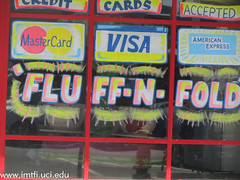Although they are not going to completely supplant cash money anytime soon, credit cards are a vital part of personal finance and will certainly remain so in the future. Banks continue to increase all of their account fees, so more and more people are moving to credit. Check out the suggestions provided below to pick up some great ideas for using credit cards more effectively.
You should pay any credit cards with high interest rates before paying those with lower ones. You should never have a large debt on a high interest card because this interest can add an additional several hundred dollars to your accumulating debt every year. That’s why it is recommended to pay off the cards with high interest rates prior to the ones that have lower rates.
Use credit cards to spare yourself bank fees and hassles. Some credit cards have a facility where you won’t be charged a fee if you pay off the balance monthly, while debit cards are loaded with fees. Prepaid credit cards are even used by people who want to deposit their paychecks without involving a bank.
Look for a credit card that will give you cash back when you buy groceries or gas. This type of card is great for people who use their credit cards daily. You can even get $60 or more each month back in your pocket, just for buying things you already need! This is a great way to save for holiday gifts. Just make sure you pay off your card each month, since the interest you pay will wipe out the rewards you earn.
If you are looking to open your first credit card, try your bank first. They already have all of your information on file and will be more likely to approve you than other institutions. Your next choice might be the local credit union.
Keep a close eye on your balance. In addition, you should ensure you know the limit your creditor has provided you. If you do happen to go over your credit limit, the creditor will impose fees. Exceeding your credit card limit can impede your ability to pay off your balance quickly.
It might be a little tempting to whip your card out to buy everything, but you should only use it for large purchases. A lot of companies give credit users a minimum amount they must spend before they can use credit, and that means you’ll be scrambling for impulse items to buy so you can use your card. The rule of thumb is to use your credit card when the amount due is over $10.
If your primary motivation for acquiring a new credit card is its rewards or cash back program, you need to make an effort to learn all of the rules and regulations that govern the the card’s programs before you sign up. Many rewards or bonuses have an expiration date; you should figure out whether or not you will be able to make full use of them within the time limit.
Create a spending budget for your credit cards. Include your credit when planning your monthly budget. Try not to think of credit cards as a source of extra money. Set aside money each month that you can use to pay for credit purchases. Stay within your budget and pay any balance off each month.
Review your credit card statements thoroughly every month. Verify each of the charges on the statement, make sure all the credits that you are due appear, and look out for strange or unexpected charges. A credit card company will correct errors if you contact them as soon as you notice the mistakes.
Debit cards are now being regulated and fees are being attached to them so many people are opting to use credit cards in their place. It is possible for you to learn how to benefit from this market. Implement the tips you’ve just read into your life
